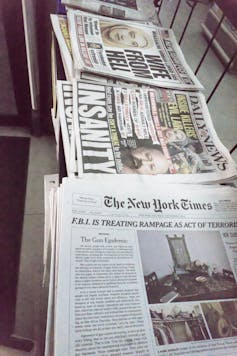How to consume news while maintaining your sanity
- Written by Aly Colón, Knight Professor of Journalism Ethics, Washington and Lee University
The amount and variety of news produced today often tests people’s ability to determine its value and veracity. Such a torrent of information[1] threatens to drown news consumers in a river of confusion.
Media coverage of the coronavirus, for example, illustrates how news may overwhelm and confuse consumers, and even contribute to mental health woes[2] by escalating anxiety.
The overabundance also undermines Americans’ ability to decipher fact from misinformation[3].
But techniques exist for ferreting out what we can trust and what we should question, and there are steps we can take to help determine where the news comes from.
The owners of news media outlets often bring their own view of the news they want their organization to focus on. Some see themselves as information providers. Others may want to advance agendas they believe in.
One example of what should be covered in the news was provided by New York Times publisher Adolph Ochs in 1897. It still appears on the newspaper’s masthead: “All the News That’s Fit to Print[4].”
This statement of values enables us to understand what the journalist or news organization wants to convey and why. Understanding the messenger helps us understand the message.
As a longtime journalist, and as a journalism professor[5] who teaches media ethics, I believe news consumers should bring a critical eye to the news.
Here’s a list you can use when reading, listening to or watching news. It offers steps to bring better focus and context to the relentless news feed.
1. What’s news to you?
What is news? News, at its core, focuses on information that is “new.” It conveys the latest knowledge about local, state, national and international occurrences. Other definitions can be found here[6], here[7] and here[8].
What’s the difference between your definition of news and that of news providers? The American Press Institute notes[9] that journalism seeks to determine “newsworthiness.” That, it says, involves verification and value.
2. Learn more about the news you turn to
What news organization produces the news you turn to, and what does its mission statement disclose about its purpose and promises?
Who does it identify as the audience it serves?
What a news organization says it stands for can be found online. For examples, search for an “About” heading, a mission statement or “policies and standards[10].”
 Stacks of newspapers on a New York City street.
Richard Levine/Corbis via Getty Images[11]
Stacks of newspapers on a New York City street.
Richard Levine/Corbis via Getty Images[11]
3. Become familiar with journalists your news comes from
What are the names of the journalists associated with the news story, and what’s their background? Check online.
How accurate has their work been? You can turn to news research organizations like Poynter[12] and other independent groups focused on transparency and fact-checking.
What approach do they take? Is it straight, interpretative or personal? Straight news focuses on verifiable facts. The interpretive approach adds the journalist’s understanding of the subject matter. And the personal approach offers the journalist’s opinions.
4. Compare different sources of news on the same subject
Consume news from sources across the news spectrum when possible – from local to regional to national and international.
Ask yourself the following questions: How do they frame the same news from their vantage point? What, if any, slant seems apparent? What’s the focus of their lens on the news?
5. Compare notes with others you trust and maybe don’t trust
Ask your friends, and even those who aren’t friends, what their take is on the news. What news sources do they turn to that they trust? How do they evaluate their news?
Seek out different perspectives so you can compare them with your own.
6. Seek out commentary from those who analyze news
Look for columnists or commentators whose views you share. Seek out columnists and commentators whose views you don’t share.
Here is a list provided by The Washington Post[13] of columnists across the political spectrum, with a brief description of their focus.
The New York Times has a host[14] of them, too. And so does the Tribune Content Agency[15].
Try to understand where they are coming from and why.
7. Decide what news matters to you, and what doesn’t
Be open about the news you consume.
Contact news producers when you think their news is incomplete or incorrect. Professional news producers welcome constructive feedback. They see it as beneficial to improving.
Consult other sources of news and knowledge for more insight on the news: magazines, books, podcasts and Instagram, for example.
Consume a variety of news: the good, the bad and, if necessary, the ugly.
Finally, take a break from news. Too much news overwhelms. The right diet of news enlightens.
[Over 106,000 readers rely on The Conversation’s newsletter to understand the world. Sign up today[16].]
References
- ^ torrent of information (theconversation.com)
- ^ contribute to mental health woes (theconversation.com)
- ^ decipher fact from misinformation (www.pewresearch.org)
- ^ All the News That’s Fit to Print (www.britannica.com)
- ^ journalism professor (my.wlu.edu)
- ^ here (www.masscommunicationtalk.com)
- ^ here (www.merriam-webster.com)
- ^ here (www.dictionary.com)
- ^ American Press Institute notes (www.americanpressinstitute.org)
- ^ policies and standards (www.washingtonpost.com)
- ^ Richard Levine/Corbis via Getty Images (www.gettyimages.com)
- ^ Poynter (www.poynter.org)
- ^ list provided by The Washington Post (www.washingtonpost.com)
- ^ host (www.nytimes.com)
- ^ Tribune Content Agency (tribunecontentagency.com)
- ^ Sign up today (theconversation.com)
Read more https://theconversation.com/how-to-consume-news-while-maintaining-your-sanity-160070

















